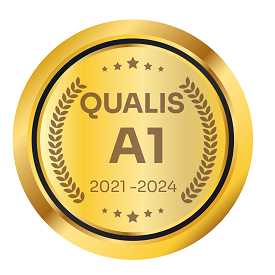El impacto de la educación en la crisis epidémica de COVID-19 en las actitudes de los consumidores
Modelos y transiciones
DOI:
https://doi.org/10.22633/rpge.v25iesp.7.16186Palabras clave:
Actitudes del consumidor, Educación, Sociedad de consumo, Ideas sobre el consumo, Pandemia COVID-19Resumen
El objetivo principal de este estudio es analizar las características del cambio de la estructura de consumo de los residentes urbanos y el impacto de la educación en tiempos de crisis económica. Como método de investigación se utiliza el método del cuestionario, que permite identificar de forma eficaz las peculiaridades de las ideas de los habitantes urbanos sobre el cambio en el grado de satisfacción de diferentes grupos de necesidades durante el período de autoaislamiento. A partir de los resultados adquiridos, el artículo describe el impacto del cambio en la estructura del consumo sobre la salud y el bienestar social de la población en la crisis económica moderna. Se revela que la economía en productos alimenticios se da principalmente por la optimización de la canasta de consumo y el cambio a análogos más baratos. Se muestra que la crisis no afectó tanto al consumo de alcohol como al consumo de alimentos.
Descargas
Citas
ALHUBAISHY, A.; ALJUHANI, A. The Influence of Information Sharing through Social Network Sites on Customers’ Attitudes during the Epidemic Crisis of COVID-19. Journal of Theoretical and Applied Electronic Commerce Research, v. 16, n. 5, p. 1390-1403, 2021.
BAI, C.; QUAYSON, M.; SARKIS, J. COVID-19 Pandemic Digitization Lessons for Sustainable Development of Micro-and Small-Enterprises. Sustainable Production and Consumption. 2021.
BARANOV, V. V. et al. Student attitude to ethical consumption as new ecological practice. Humanities and Social Sciences Reviews, v. 7, n. 4, p. 1173-1179, 2019.
BARTSCH, S. et al. Leadership matters in crisis-induced digital transformation: how to lead service employees effectively during the COVID-19 pandemic. Journal of Service Management, 2020.
BAUDRILLARD, J. Consumer society. Its myths and structures. Moscow: Cultural Revolution, 2006.
BOYACΙ-GÜNDÜZ, C. P. et al. Transformation of the Food Sector: Security and Resilience during the COVID-19 Pandemic. Foods, v. 10, n. 3, p. 497, 2021.
DENISOV, B. A. On the economic criteria of the value of fine art works. Russian Economic Journal, v. 4, p. 105-109, 1996.
FITRIASARI, F. How do Small and Medium Enterprise (SME) survive the COVID-19 outbreak?. Jurnal Inovasi Ekonomi, v. 5, n. 2, 2020.
FOROUDI, P.; TABAGHDEHI, S. A. H.; MARVI, R. The gloom of the COVID-19 shock in the hospitality industry: A study of consumer risk perception and adaptive belief in the dark cloud of a pandemic. International Journal of Hospitality Management, v. 92, 102717, 2021.
GALANAKIS, C. M. et al. Innovations and technology disruptions in the food sector within the COVID-19 pandemic and post-lockdown era. Trends in Food Science & Technology, 2021.
GLADAREV, B. Stratification model of consumer society (interpreting Bruno Latour and Jean Baudrillard). Boundless sociology. St. Petersburg: Centre for Independent Social Research, 2006.
GUROVA, O. The life expectancy of things in Soviet society: notes on the sociology of underwear. An inviolable reserve, v. 34, p. 78-84, 2004.
GUZHEVA, E. G. Theory of consumption: conceptual approaches to the development of the national economy: Doctoral Dissertation. St. Petersburg: St. Petersburg State University of Architecture and Civil Engineering, 2000.
HABERMAS, Y. Welfare state crisis and exhaustion of utopian energy. Political works. Moscow: Praxis, 2005.
ILYIN, V. I. Consumer behavior: Study guide. St. Petersburg: Peter, 2000.
KALININ, A. S. Consumer society as a subject of socio-philosophical research. 2009. Dissertation (Doctorate) – Kostroma State University named after N.A. Nekrasov, Kostroma, 20096.
KRASILYTSIKOV, V. A. Modernization and Russia on the threshold of the XXI century. Questions of philosophy, v. 10, p. 40-56, 1993.
MARCUSE, G. Eros and Civilization. One-dimensional man: A study of the ideology of industrial society’s development. Moscow: AST publishing house, 2002.
MEHTA, S.; SAXENA, T.; PUROHIT, N. The new consumer behaviour paradigm amid COVID-19: Permanent or transient? Journal of Health Management, v. 22, n. 2, p. 291-301. 2020.
MIKHAILOVA, O.; GUROVA, O. The consumer in the mall: between freedom of choice and spatial restrictions. Journal of Sociology and Social Anthropology, v. 1, p. 5-65, 2009.
RAPACCINI, M. et al. Navigating disruptive crises through service-led growth: The impact of COVID-19 on Italian manufacturing firms. Industrial Marketing Management, v. 88, p. 225-237, 2020.
SOROKOUMOVA, E. A. et al. Social representations of the metropolis residents on the ecology of women’s corporeality in the structure of civil identity. EurAsian Journal of BioSciences, v. 14, n. 1, p. 587-592, 2020.
VOLKOV, V. V.; KHARKHORDIN, O. V. Theory of practice. St. Petersburg: Publishing House of the European University in St. Petersburg, 2008.
YAKOVLEVA, A. A. Retretism in consumer society. In: St. Petersburg Sociology Today: Collection of scientific works of Sciences Russian Academy Sociological Institute. Saint Petersburg: Nestor-Istoriya. 2011. p. 215-235.
Publicado
Cómo citar
Número
Sección
Licencia
Derechos de autor 2022 Revista on line de Política e Gestão Educacional

Esta obra está bajo una licencia internacional Creative Commons Atribución-NoComercial-CompartirIgual 4.0.
Manuscritos aceitos e publicados são de propriedade da Revista on line de Política e Gestão Educacional. É vedada a submissão integral ou parcial do manuscrito a qualquer outro periódico. A responsabilidade do conteúdo dos artigos é exclusiva dos autores. É vedada a tradução para outro idioma sem a autorização escrita do Editor ouvida a Comissão Editorial Científica.











